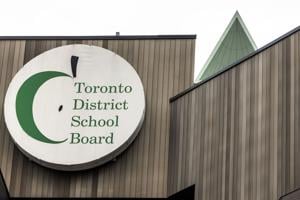Education
Toronto School Board Halts Controversial Lottery Consultations

The Toronto District School Board (TDSB) has unexpectedly cancelled public consultations regarding its contentious lottery-based admissions policy for specialty programs. The board indicated that an update will be forthcoming but did not provide any specifics. This decision follows the launch of a public survey earlier this year, intended to gather feedback on the policy, which was scheduled to remain open until late November.
In recent weeks, the TDSB’s website was quietly updated, stating that consultations “will not continue as scheduled.” On November 1, 2023, the link to the survey was disabled, raising questions among stakeholders about the future of the admissions process. Critics of the lottery system are hopeful that this development could signal a shift back to merit-based assessments.
The cancellation has sparked mixed reactions. Some community members have praised the move, while others have condemned it as “a sham.” Parents have expressed concerns about the lack of transparency and the need for community involvement in decisions regarding admissions to high-demand programs in arts, athletics, science, and mathematics.
Logan Wilson, a concerned parent, voiced her frustration: “I don’t think you can call it public education if we don’t get a say — it’s in the name.” She described her anger over the cancellation, stating that the elimination of parent consultation could lead to decisions being made without community input.
A spokesperson for the TDSB noted that since the appointment of provincial supervisor Rohit Gupta, feedback from families and school communities has been considered. Gupta is currently reviewing admissions processes and is expected to provide an update on the policy for the 2026-2027 school year.
Historically, admission to specialized programs was based on merit, requiring students to audition, take entry exams, and submit portfolios or personal essays. In May 2022, the TDSB transitioned to the Student Interest Programs policy, which allowed any student expressing interest to apply. This change aimed to enhance equity and increase access for under-represented groups. When demand for these programs exceeds available spots, a lottery is employed, prioritizing students from underserved communities.
The new policy has generated significant debate. Supporters argue that the lottery system helps dismantle systemic barriers, while opponents claim it undermines academic excellence and has led to student disengagement. Some students and parents have reported issues with the quality of education in lottery-admitted cohorts, citing a mismatch in preparedness among students.
In the spring of 2023, TDSB officials announced plans for public consultations to revise the policy. However, following the province’s takeover of the board due to financial mismanagement, the ability of trustees to make decisions was curtailed, leaving parents feeling sidelined.
Safraw Hanif, co-chair of her children’s elementary school parent council, expressed disappointment over the cancellation. “It’s like you’re taking away parents’ voices,” she said, noting that many parents already feel unrepresented since trustees lost their decision-making powers. Although she is against requiring merit-based assessments such as auditions or exams, she opposes the lottery system and advocates for expanding program availability to accommodate all interested students.
Trustee Weidong Pei, who has been vocal against the lottery, described the cancellation of consultations as “wonderful.” He criticized the previous survey for lacking clarity, stating that it did not adequately address the lottery system. “Most parents don’t even know what P100 is,” he remarked, suggesting that clear communication is essential for effective community engagement.
On the other hand, Trustee Michelle Aarts, who supports the lottery system, expressed concern that the abrupt cancellation of the consultation process undermines transparency. “I have a big problem, as a parent, with decisions being made behind closed doors,” she stated. Aarts emphasized the importance of maintaining equitable access to programs while highlighting the expectations that parents had regarding the consultation.
Student Trustee Victor Jiang, a senior at Marc Garneau Collegiate in the TOPS Program, voiced strong opposition to the lottery system. He argued that students admitted through lottery processes often lack the preparation necessary for success, leading to a diluted curriculum. Jiang, part of the last merit-based cohort, believes that the solution lies in reverting to merit-based admissions.
As stakeholders await further information from the TDSB, the future of admissions policies for specialty programs remains uncertain, leaving many parents and students anxious about the direction of public education in Toronto.
-

 Science3 months ago
Science3 months agoToyoake City Proposes Daily Two-Hour Smartphone Use Limit
-

 Top Stories3 months ago
Top Stories3 months agoPedestrian Fatally Injured in Esquimalt Collision on August 14
-

 Health3 months ago
Health3 months agoB.C. Review Reveals Urgent Need for Rare-Disease Drug Reforms
-

 Technology3 months ago
Technology3 months agoDark Adventure Game “Bye Sweet Carole” Set for October Release
-

 World3 months ago
World3 months agoJimmy Lai’s Defense Challenges Charges Under National Security Law
-

 Lifestyle3 months ago
Lifestyle3 months agoVictoria’s Pop-Up Shop Shines Light on B.C.’s Wolf Cull
-

 Technology3 months ago
Technology3 months agoKonami Revives Iconic Metal Gear Solid Delta Ahead of Release
-

 Technology3 months ago
Technology3 months agoApple Expands Self-Service Repair Program to Canada
-

 Technology3 months ago
Technology3 months agoSnapmaker U1 Color 3D Printer Redefines Speed and Sustainability
-

 Technology3 months ago
Technology3 months agoAION Folding Knife: Redefining EDC Design with Premium Materials
-

 Technology3 months ago
Technology3 months agoSolve Today’s Wordle Challenge: Hints and Answer for August 19
-

 Business3 months ago
Business3 months agoGordon Murray Automotive Unveils S1 LM and Le Mans GTR at Monterey









